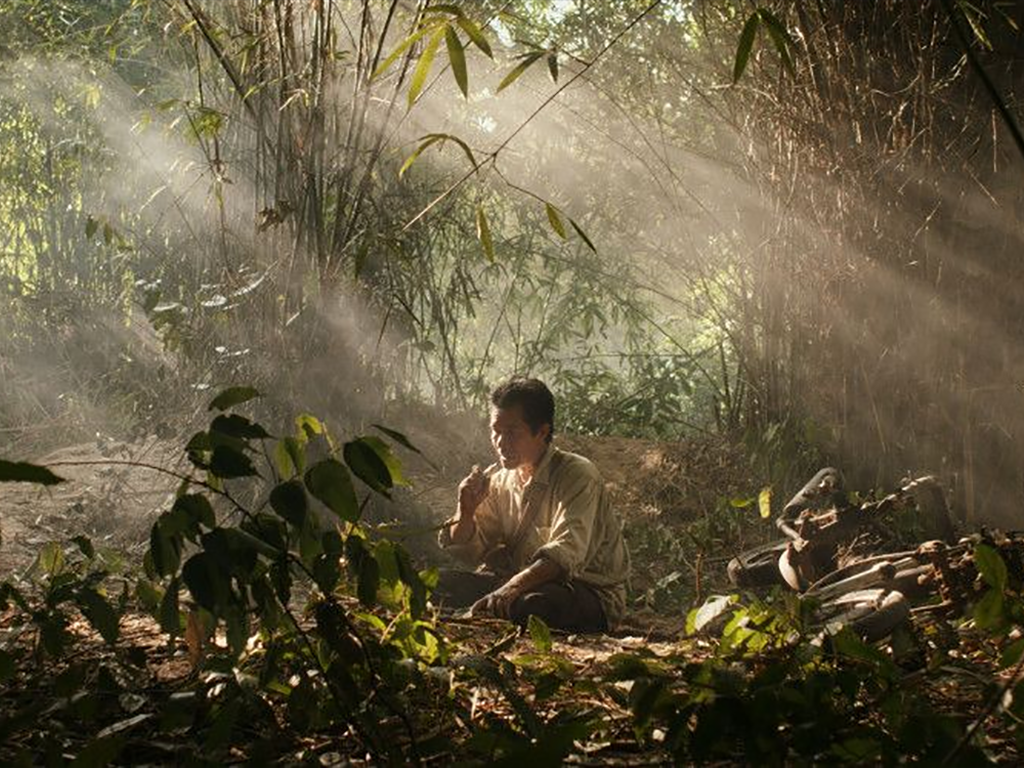Quick summary:
Fifty years after witnessing the death of a young woman (Noutnapha Soydala), a nameless old man (Yannawoutthi Chanthalungsy) is still haunted by her spirit. When he realizes she possesses the ability to transport him back in time, he visits his younger self in an attempt to mitigate his mother's suffering as she dies of a terminal illness. While The Old Man initially seems well-intentioned, something sinister lurks beneath the surface.
Vibe:
Watching "The Long Walk" is like waking up in the middle of a nightmare and struggling to untangle reality from fiction. There's a level of disorientation that never quite abates, even as the credits roll. Some aspects of this film are left unexplained, which might bother some viewers; however, how often do disparate feelings or events perfectly coalesce into something easily digestible? In art, I don't mind a certain level of opaqueness as long as it serves aesthetic goals.
This might be a little reductive, but it reminded me of "Tigers Are Not Afraid" (López, 2017) and "Atlantics" (Diop, 2019). All three are dark indie fables specific to their locations (Mexico, Senegal, and Laos, respectively).
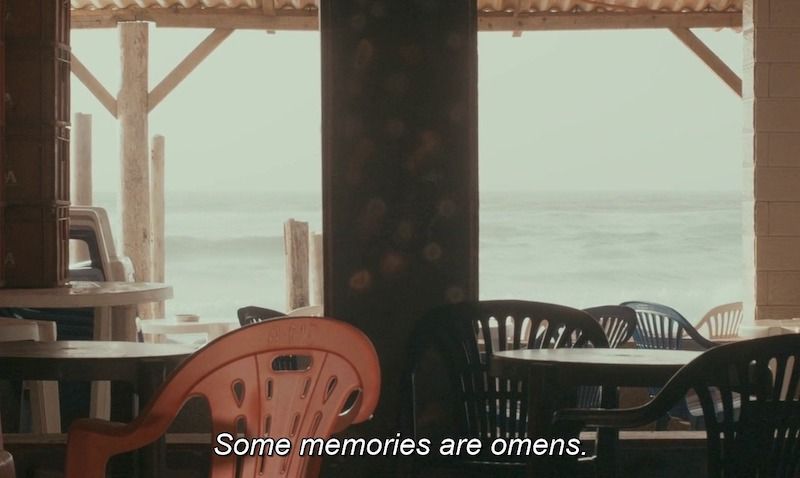
Best time to watch:
Make sure you have the attention span for a slow, atmospheric burn with heavy philosophical implications before pressing play. Between the subtitles and the time travel, anyone who is not paying close attention will grow frustrated as the thread of the plot slips away. This film requires active engagement from the viewer and those unable to focus will likely have a subpar experience.
Worst time to watch:
This isn't the type of movie that will sink you into a deep depression, but it's certainly not smooth brain content. If you need a surefire distraction from WWIII, I recommend seeking out something light and funny, like "Ruggles of Red Gap" (McCarey, 1935), "My Man Godfrey" (La Cava, 1936), or the new season of "The Marvelous Mrs. Maisel." The shittastic "Sex and the City" reboot, "And Just Like That," is likewise worth a rage watch.
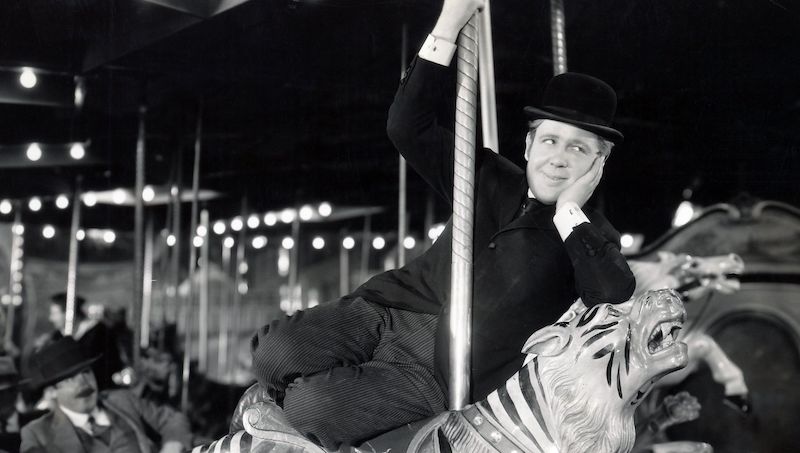
Where to watch:
"The Long Walk" is now streaming on VOD.
Thoughts:
I knew I had to see this film when I spoke with Kate Robertson last year and she mentioned how much she loved it. I'm not as much of a genre enthusiast as her, but I can usually fuck with a slow burn time travel movie and "The Long Walk" is no exception. From the first scene, I was immersed in the film's languid environment and mysterious protagonist.
When we're first introduced to The Old Man (most of the characters are not given names), he's uncovering a wrecked motorbike that hides beneath dense jungle vegetation. As he cuts it free from the undergrowth, a low shot of the ground reveals a human skull. Now on a remote dirt road, he stops to leave an orange on a small altar covered in melted white and yellow candles. It's unclear in this moment if he knew the deceased, but his purposeful actions suggest they were acquainted. After leaving his offering, he presses down on his inner wrist to reveal the time glowing beneath his skin, courtesy of an implanted microchip that keeps track of the country's citizens and their financial holdings.
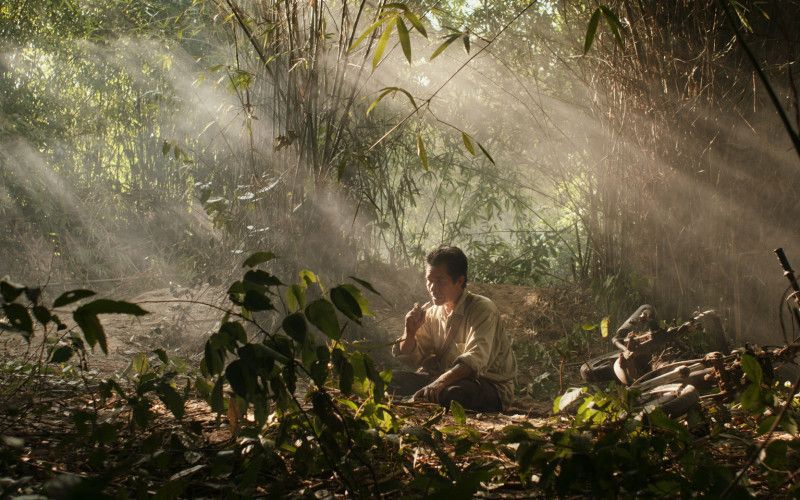
This juxtaposition of futuristic technology and the remote location brings to mind a setting outside of time or place. Just when you think you know what you're dealing with, additional details throw that understanding back into question. Thinking about the future of Laos, one of the poorest but fastest growing countries in Asia, adds another layer of meaning to these world building choices. When the west began intervening in Laos post-Cold War, foreign aid was provided, but often not in a form that gave people what they actually needed. In the near future, it's not difficult to imagine a country that has advanced to the point where innovative technology and extreme poverty coexist (just look at the United States).
Another strange aspect of the film is The Girl (Noutnapha Soydala). As The Old Man walks into town to pawn his scavenged bike parts, she ambles down the dirt road beside him. He remarks that they've been walking together for fifty years in silence, indicating that she, mid-twenties at most, must be a ghost. Framed in a long shot, their facial expressions aren't discernible, but body language conveys an easy familiarity if not a legitimate affection. There is no immediate explanation for the woman's presence, just a lingering sense of unease left in her wake.
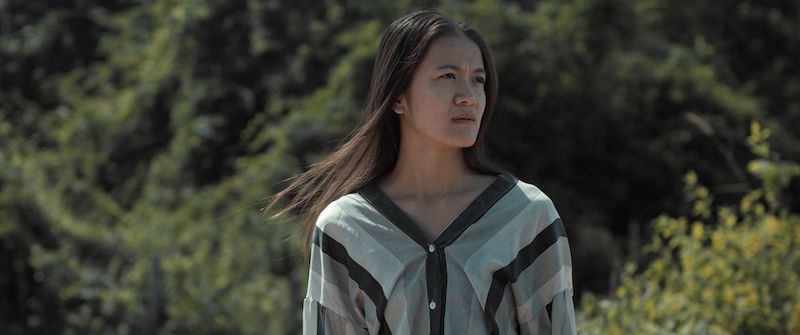
Although The Old Man is our protagonist, he feels like a stranger for most of the film. He has a quiet, gentle demeanor that doesn't immediately throw up red flags, even when the opening sequence reveals an older woman lying dead in a padlocked room of his house. I figured there must be an explanation, even as ominous music played and he took serial killer souvenirs, a necklace and a finger, from her body. While burying her in the yard under the glow of candlelight, the spirit of the dead woman watches. He tells her, "You'll be safe here. And you won't be alone." While his actions are deeply suspect, The Old Man seems to believe he's some kind of savior who is preventing this woman from an afterlife of loneliness.
Before the opening credits roll, director Mattie Do and writer Christopher Larsen (her regular collaborator and spouse) subtly establish "The Long Walk" as a Laotian ghost story with sci-fi elements. From here, they throw the viewer into overlapping stories that are intentionally difficult to untangle. In the scene following the title credits, a young boy (Por Silatsa) helps his ailing mother (Chanthamone Inoudome) prepare her vegetable stand before she orders him to walk home. On his way there, he stumbles across a young woman, dying in the jungle after a motorbike accident. Struggling to breath, she asks The Boy not to leave her alone. With surprising maturity, he holds her hand as she takes her final breath. We now have an answer to the question of how The Girl and The Old Man know each other.
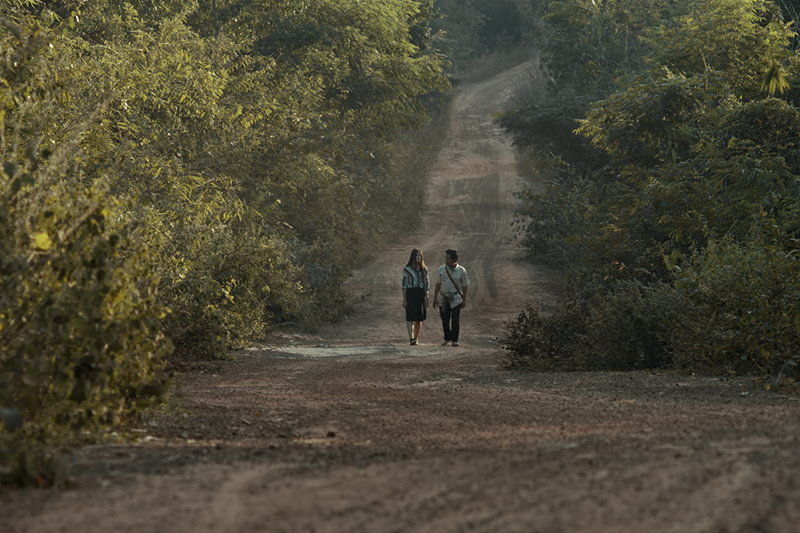
At this point, the story feels like it's going to move in a straightforward direction where flashbacks from The Old Man's childhood help contextualize his current behavior. Instead, he travels back in time (with the help of the spirit woman) in an attempt to change events from his childhood. Although his endeavors are somewhat successful, they have untoward consequences. On its face, this isn't a particularly unique storytelling device, but lack of direct correlation between cause and effect opens up room for interpretation.
Instead of using two distinct timelines, one in the present and one in the past, there are multiple interwoven possibilities that exist simultaneously. In this film, time travel and its implications do not function on a linear plane. There are no visual indicators that distinguish the past from the present or the living from the dead. It's hard to map specific actions to their outcomes. The Girl doesn't only allow The Old Man to travel back in time; she also brings The Boy into the future. Because they are the same person but in different phases of life, it makes sense for them to exist together. Growing older doesn't erase previous experiences but it provides different lenses through which to view them.
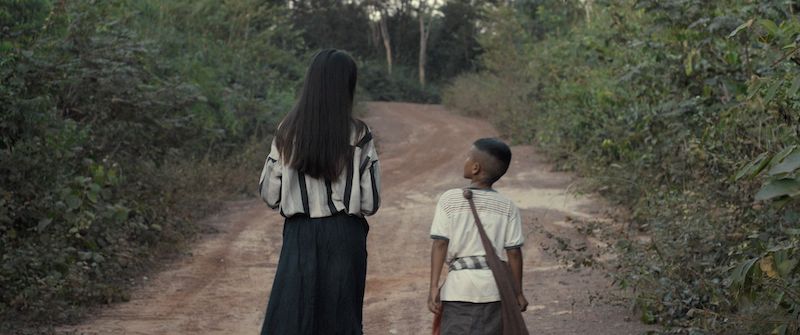
Instead of basing the entire plot of the film around the art of time travel, Do and Larsen use it as a vehicle for much deeper themes. Trauma, loneliness, and regret are the film's primary concerns; time travel is merely the vehicle for exploring them. When The Old Man was The Boy, his mother died of a terminal illness. He watched her suffer, helpless to mitigate her pain. As an adult, he never properly processed this trauma. He isolated himself in the same house from his childhood and failed to forge meaningful connections. To stave off the loneliness, he starts killing sick women in the community to "save" them from their suffering. Eventually, his meddling — both with these women and with his past — lead to his downfall.
At the end of the film, I found myself thinking about the cyclical nature of trauma. It ripples into all facets of life in unpredictable ways. There is no immediate salve to soothe the pain. You can cut everyone off and refuse to acknowledge it, but it will eventually come back with horrifying new dimensions. The only way to move forward is to accept reality and learn to make peace with regret. Otherwise, the damage will continue to manifest, not only in the recipient's life, but in that of future generations. Until the cycle is broken, the chokehold of the past endures.
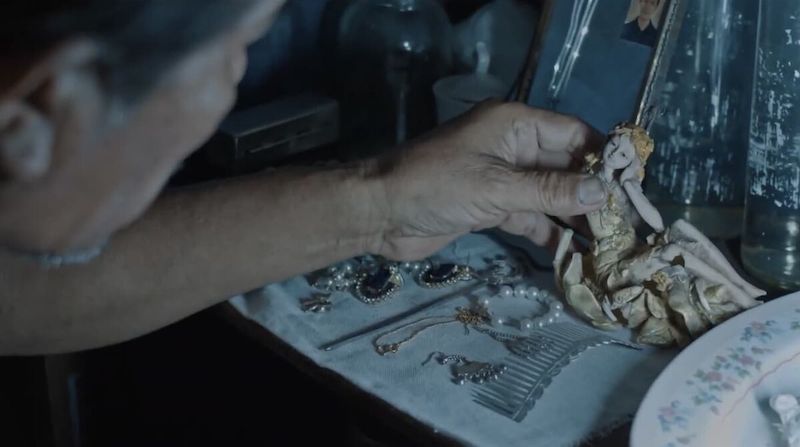
Stray observations:
- Here is a link to Robertson's wonderful piece about this film in Metro Magazine, but it is unfortunately behind a paywall. I ponied up the $5 AUD to read it and found it very useful for helping me to organize my own thoughts.
- Do is the first (and only) female Lao filmmaker. "The Long Walk" is her third feature. I've heard great things about "Dearest Sister" (2016), which is currently streaming on Shudder, and plan to watch that one next. Yannawoutthi Chanthalungsy and Vilouna “Totlina” Phetmany are both in it.
- It's been almost a decade since I've read Deleuze's "Cinema 1" and "Cinema 2" but from what I remember, this film is a good example of the time-image, in both its content, structure, and the overall viewing experience. It would be interesting to compare it with "Last Year at Marienbad" (1961) or "The Mirror" (1975). Smart people out there, please make this happen.
- When I first watched this film, I was unsure about it. It was late, I was tired, and I felt like I wasn't giving it my full attention. When I watched it again with my faculties intact, I couldn't stop thinking about it. This is why I can't write reviews quickly. My hot takes are often not that great.
- Matthew Macar's cinematography is absolutely stunning and makes great use of natural light. In her essay, Robertson mentions that he was brought onto the project after production started and the role unexpectedly needed to be filled.
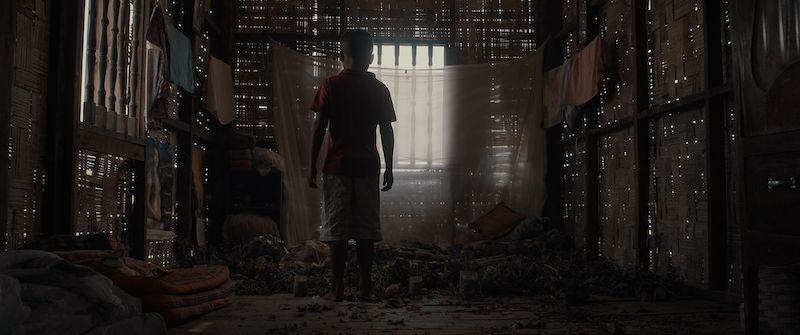
- My interview with Do contains spoilers, but I recommend it for anyone who wants a deeper dive.
- What I love most about Do's direction is her refusal to spoon-feed the viewer information. The script is very minimal and I think a less assured director would have intervened more to ensure that certain themes came across clearly. Do refuses to take that approach and the film is much stronger as a result.
- No, this is not an adaptation of the Stephen King novel. Yes, it has the same name. I fear this will be an SEO problem for the film in English speaking countries.

